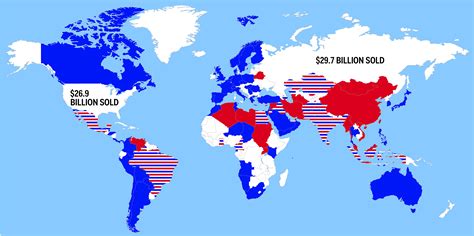Facility Manager Duties and Responsibilities
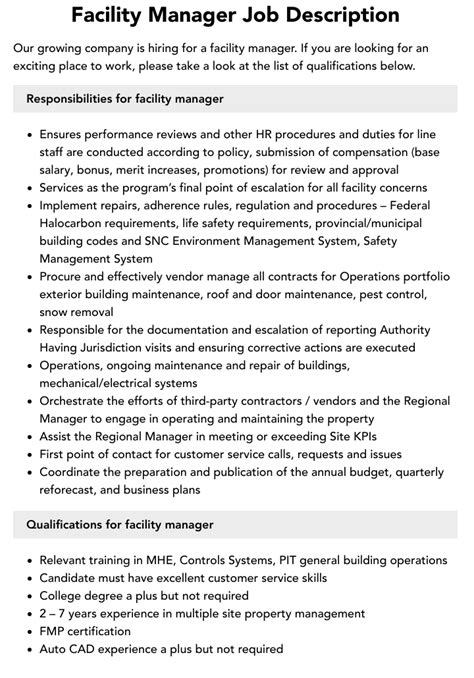
The Role of a Facility Manager: Understanding Duties and Responsibilities
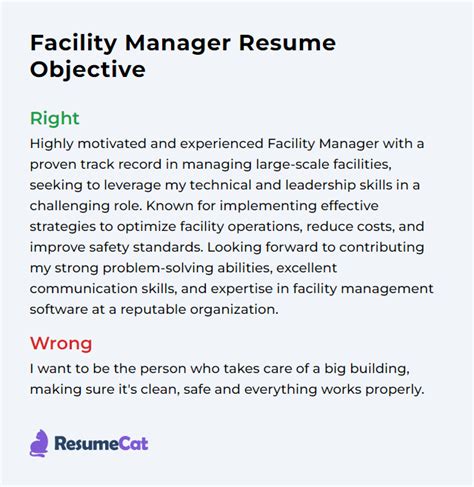
A facility manager plays a vital role in ensuring the smooth operation of a company’s physical assets, including buildings, grounds, and equipment. The duties and responsibilities of a facility manager can vary depending on the organization, industry, and location, but their primary goal is to provide a safe, efficient, and cost-effective work environment.
Key Responsibilities of a Facility Manager
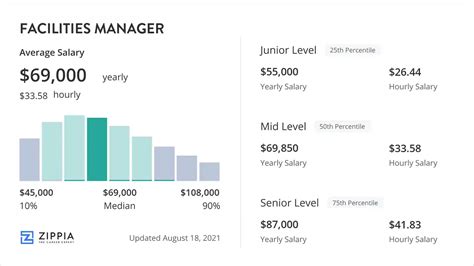
Facility managers are responsible for a wide range of tasks, including:
- Building Maintenance: Ensuring that all aspects of the building, including plumbing, electrical, and HVAC systems, are functioning properly.
- Space Planning: Managing the allocation of office space, including assigning workstations, meeting rooms, and other facilities.
- Facilities Operations: Overseeing the day-to-day operations of the facility, including janitorial services, waste management, and grounds maintenance.
- Budgeting and Financial Management: Developing and managing budgets for facility-related expenses, including maintenance, repairs, and capital projects.
- Risk Management: Identifying and mitigating potential risks and liabilities associated with the facility, including ensuring compliance with regulatory requirements.
- Sustainability and Energy Management: Implementing sustainable practices and reducing energy consumption to minimize the facility’s environmental impact.
- Vendor Management: Selecting and managing vendors, including contractors, suppliers, and service providers.
- Emergency Preparedness: Developing and implementing emergency response plans, including evacuation procedures and business continuity planning.
- Compliance: Ensuring compliance with relevant laws, regulations, and industry standards, including building codes, accessibility standards, and environmental regulations.
Facility Manager Skills and Qualifications

To be successful, a facility manager should possess a combination of technical, business, and soft skills, including:
- Technical Knowledge: Familiarity with building systems, including mechanical, electrical, and plumbing systems.
- Communication Skills: Ability to communicate effectively with stakeholders, including employees, management, and vendors.
- Project Management Skills: Ability to manage multiple projects simultaneously, including budgeting, scheduling, and resource allocation.
- Problem-Solving Skills: Ability to analyze problems and develop effective solutions.
- Leadership Skills: Ability to lead and manage a team of maintenance staff, contractors, and vendors.
- Business Acumen: Understanding of business principles, including budgeting, financial management, and strategic planning.
- Certifications: Industry-recognized certifications, such as Certified Facility Manager (CFM) or Facility Management Professional (FMP).
Benefits of Hiring a Facility Manager
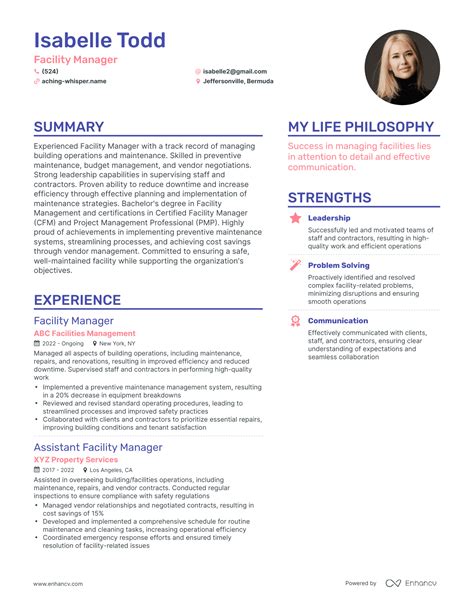
Hiring a facility manager can bring numerous benefits to an organization, including:
- Cost Savings: Reduced maintenance and energy costs through effective management and optimization of building systems.
- Improved Productivity: Enhanced work environment, resulting in increased employee productivity and morale.
- Risk Reduction: Minimized risk of accidents, injuries, and property damage through proactive maintenance and risk management.
- Compliance: Ensured compliance with regulatory requirements, reducing the risk of fines and penalties.
- Strategic Planning: Alignment of facility management with organizational goals and objectives.
Tools and Software for Facility Managers
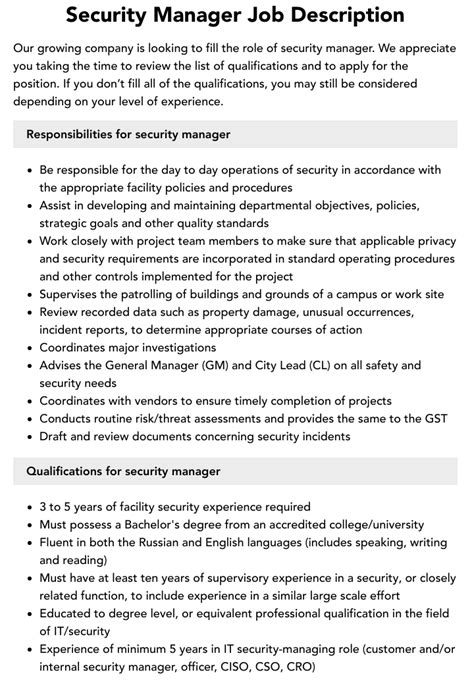
Facility managers can utilize a variety of tools and software to streamline their duties and responsibilities, including:
- Computer-Aided Facility Management (CAFM) Software: Software that helps manage maintenance requests, track work orders, and analyze facility performance.
- Building Management Systems (BMS): Systems that monitor and control building systems, including HVAC, lighting, and security.
- Energy Management Systems (EMS): Systems that track energy consumption and provide recommendations for energy efficiency.
- Space Management Software: Software that helps manage space allocation, including assigning workstations and meeting rooms.
📝 Note: The specific tools and software used may vary depending on the organization's size, industry, and needs.
Best Practices for Facility Managers
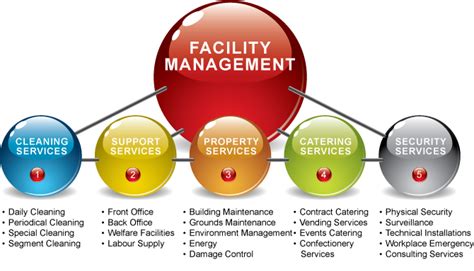
To excel in their role, facility managers should follow best practices, including:
- Regular Maintenance: Regular maintenance and inspections to prevent equipment failures and reduce downtime.
- Energy Efficiency: Implementation of energy-efficient practices and technologies to minimize energy consumption.
- Sustainability: Adoption of sustainable practices and materials to reduce the facility’s environmental impact.
- Communication: Regular communication with stakeholders, including employees, management, and vendors.
- Training and Development: Ongoing training and development to stay up-to-date with industry trends and best practices.
What is the role of a facility manager?
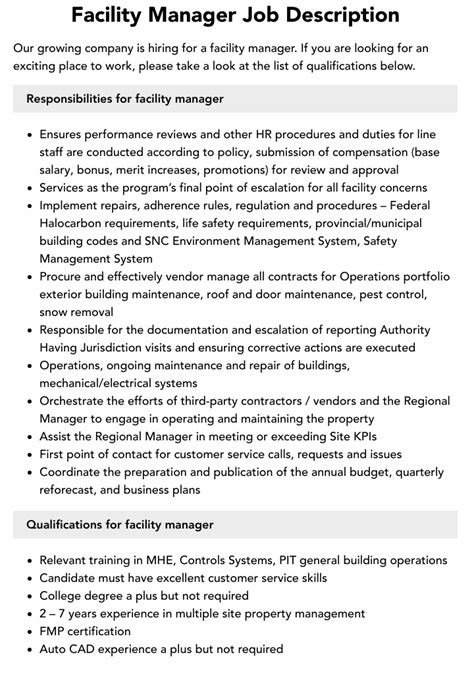
+
A facility manager is responsible for the day-to-day operations of a company's physical assets, including buildings, grounds, and equipment.
What are the key responsibilities of a facility manager?

+
Key responsibilities include building maintenance, space planning, facilities operations, budgeting and financial management, risk management, sustainability and energy management, vendor management, emergency preparedness, and compliance.
What skills and qualifications are required to be a successful facility manager?
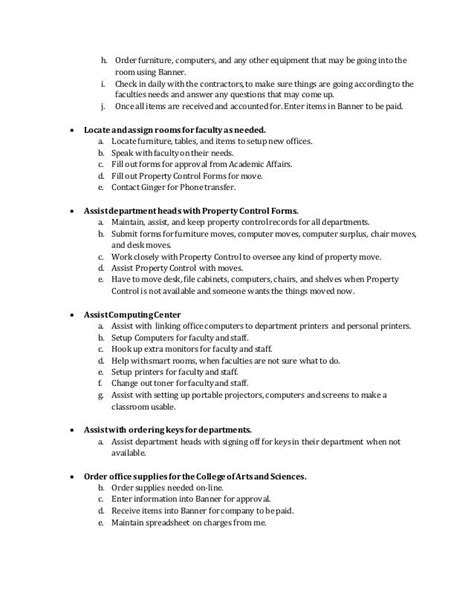
+
A successful facility manager should possess technical knowledge, communication skills, project management skills, problem-solving skills, leadership skills, business acumen, and industry-recognized certifications.
In conclusion, a facility manager plays a vital role in ensuring the smooth operation of a company’s physical assets. By understanding their duties and responsibilities, skills and qualifications, and best practices, organizations can hire and support effective facility managers who can drive cost savings, improve productivity, and reduce risk.
Related Terms:
- Job desk facility manager
- Facility Manager salary
- Facility Manager jobs
